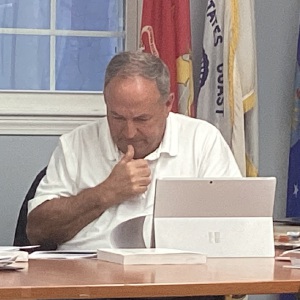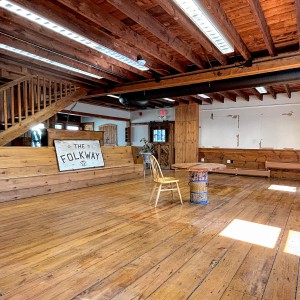Friends and family remember Tim Clark
| Published: 11-12-2021 11:16 AM |
“When I die, how many...will weep for me? What difference have I made?”
So wondered Tim Clark in his column “A Teacher’s Funeral,” published 20 years ago in the early stages of his teaching career. In the wake of his sudden death from a stroke last week, the answer emerged, resounding.
“There is no doubt that he positively affected so many, and yet he would have been flabbergasted at the scope of his reach,” said Dublin Community Church pastor and longtime friend Traceymay Kalvaitis.
Teaching, writing, performing and speaking were some of the many avenues through which the Dublin resident engaged the community with his curiosity, encouragement and depth of knowledge. A master of the English language, Clark’s contributions to the community spanned reporting and editing at Yankee Magazine and the Old Farmer’s Almanac, teaching at ConVal High School, acting at the Peterborough Players, serving as deacon at the Community Church, lending his voice to Ken Burns documentaries and presiding over elections and town meeting as Dublin’s moderator.
Born in Maryland in 1950, Clark was schooled at Harvard, where he met the love of his life, May, courting her with kindness and a special humor, all for her.
“He didn’t show his goofy side very often,” May said. “He had a great goofy side that I saw most of – and his kids and grandkids too.”
The two married and moved, in 1972, to southern New Hampshire, where Clark became a radio reporter at several regional stations.
“He was just a wonderful guy,” said Dayton Duncan, a fellow local journalist in the 1970s who bonded with Clark over their professional admiration of writer and host Charles Osgood and became great friends. “So intelligent, had a great sense of humor but also sometimes just sort of a calming, quiet disposition.”
Article continues after...
Yesterday's Most Read Articles
 Old Homestead Farm in New Ipswich requests variance for short-term rental cabins
Old Homestead Farm in New Ipswich requests variance for short-term rental cabins
 Scott Bakula starring in Peterborough Players’ ‘Man of La Mancha’
Scott Bakula starring in Peterborough Players’ ‘Man of La Mancha’
 HIGH SCHOOL SPORTS ROUNDUP: Tasha MacNeil leads the way for ConVal at Pelham Invita
HIGH SCHOOL SPORTS ROUNDUP: Tasha MacNeil leads the way for ConVal at Pelham Invita
 Peterborough Farmers’ Market opens for the season
Peterborough Farmers’ Market opens for the season
 Conant girls’ tennis continues to seek improvement
Conant girls’ tennis continues to seek improvement
 Former home of The Folkway in Peterborough is on the market
Former home of The Folkway in Peterborough is on the market
In 1976, Clark landed his dream job, writing at Yankee Magazine in Dublin. Clark and current Yankee editor Mel Allen came to the magazine at nearly the same time and worked together for decades.
“He could write anything,” Allen said. “He could write longform, doggerel, reviews, profiles, history, you name it. … If Tim was a ballplayer, he’d be the person that could play any position, bat anywhere in the batting order – and he could pitch.”
Clark’s colleagues marveled at his prolific writing output and speed, to the point that Allen said it was “almost disheartening” for his coworkers to look at the index of stories and see file after file under “Clark, Tim.”
“He would lap those of us who needed more time,” Allen said.
“Mel had to practically put in earplugs,” May joked, to block out the sound of Clark’s typing; his prodigious speed was due not just to his breadth of vocabulary and knowledge, but to what he called “the boys in the back room,” a crew in his head, May said.
“When he had an assignment,” and had already done the reporting, May said, “he didn’t actively think about it – he would leave it to the ‘boys in the back room.’”
The articles were always percolating in the back of his mind, and when the time came to sit down and write it, it just flowed out.
“Every story he wrote, it was turned in so fast, and always so good,” Allen said.
Whether it was a profile of Tom Rush, reporting on a captive gorilla, his first-person account of performing at the Peterborough Players or weather-report doggerel in the Old Farmer’s Almanac, Clark wrote it all, quickly, and in captivating fashion.
Clark worked full-time as writer and editor at Yankee for nearly 25 years; in 1999, he changed careers, taking a job as English teacher at ConVal High School in Peterborough.
“He went from journalism into teaching, which was a really rough transition,” Kalvaitis said. “He wanted to give up so many times in that first year of teaching, but he didn’t and he made it through and he loved it. He used that experience to give other people the courage to take risks and really push themselves.”
Clark and May would both become some of the most well-respected educators in the region, May eventually taking over as teaching principal at Dublin Consolidated School and Clark settling in to his homeroom (which included this reporter) and English classes and working with the school’s theatrical productions.
“What a dedicated teacher he was,” Duncan said. “He would talk about this student or that student and what play they were putting on with the same pride he would talk about his three children.”
As he taught at the high school, Clark also helped his own children, Dan, Joel and Liza, through their schooling.
“He came home as a teacher and a learner most of all,” Dan said, “whether he was teaching in the high school, writing for the magazine or the almanac, he was constantly learning and reading and teaching as much of that to us as we could and we’re so grateful for that. That was the role that he took on in this community and he served as a role model.”
All three Clark children found something in their parents to model themselves after, with Joel now a writer, Liza a special education teacher and Dan a health and safety manager.
“He coached me in writing and editing all through high school and that ability has served me very well,” Dan said. “The ability to think critically and to be a leader has really helped me to be effective in my current career.”
Clark took in members of the community like they were family; Allen remembered Clark housing him during a flood and showing up in the stands unannounced at his son’s Little League games to root the team on.
“I just think he was one of the most kind people I’ve ever known,” May said.
Clark was an active member of the Dublin Community Church for many years, first joining the choir at May’s cajoling, Kalvaitis said.
“They really needed more tenors in the choir, so she twisted his arm,” Kalvaitis said.
He quickly became engaged in the church and its community and grew into a “pillar of the church,” Kalvaitis said, so much so that when a previous pastor asked a group of children in front of the congregation “Who runs the church?”, they pointed to the Clarks.
“He was expecting them to say ‘God,’ Kalvaitis said, “and they said ‘Tim and May.’ The whole congregation burst out laughing…They embodied the ideal that we were all working towards, in the minds of those children.”
Clark’s even demeanor and righteous knowledge lent themselves to both church and state, as he’d also serve as the town moderator for many years, overseeing the voting process on Election Day and running the show at Town Meeting. Clark was known to inject some of that Yankee humor into the New England tradition, ending meetings with a story or joke, but when serious rulings were needed, he was just as quick to act. At Dublin’s 2021 Town Meeting, Clark stepped in to cast the tie-breaking vote in favor of the town’s traditional donation to its community center, after some residents petitioned to defund the nonprofit following statements in support of racial justice.
Clark’s public speaking abilities and love of theater brought him to the Peterborough Players, where he acted in 15 plays over the years; some of that experience was chronicled in his Yankee article “Diary of a Bit Player.”
He’d also become a voice actor, after his old friend Dayton Duncan began collaborating with Ken Burns on the Florentine Films documentaries on Americana. Clark traveled to the Walpole studios to read as a “scratch voice” for a film about Lewis and Clark. The intention, Duncan said, was to use Clark’s voice as a stand-in during production and then re-record the lines with an A-list actor in New York for the final cut.
“On rare occasions, some of the people that we bring in do it so well that we say ‘Why bother bring anyone else in to do this?’” Duncan said. “Tim was someone who time and time again ended up in the final film.”
Clark’s voice acting can also be heard in Florentine documentaries about Susan B. Anthony, Mark Twain and most recently, 2009’s “National Parks: America’s Best Idea,” where he portrays several historical figures, including naturalist George Bird Grennell.
Just a week before his death, Clark was at Florentine reading as Grennell yet again for an upcoming documentary on the American buffalo, and Duncan said there’s a good chance Clark’s voice will make it to the final cut again, one more chance for him to captivate an audience.
“Every time we watch one of our films, we’ll know we can hear his voice again,” Duncan said.
Clark also served as a focus group member of sorts for Florentine, attending screenings in Walpole and giving his honest feedback to Burns, Duncan and the crew.
“It breaks my heart that, when we’re finally a year from now sitting down at yet another screening of ‘American Buffalo,’ that Ken won’t say ‘Tim, what do you think?” Duncan said.
After hearing the news of Clark’s sudden stroke last Wednesday, Kalvaitis emailed her congregation at midnight, inviting them to the church the next day at noon to be together.
Twelve hours later, more than 100 people gathered at the church, “devastated,” she said.
“Even he would have been surprised,” Kalvaitis said, “and that is one of the most beautiful things about him. He would have been surprised at the depth of how the news of his stroke had affected people, the depths of their sadness even though he was still alive. We needed to just be together because it's like the world had just had this seismic shift.”
Clark died the next day, at 71, leaving behind countless lives made all the better for knowing him. A celebration of his life – the “teacher’s funeral” he made a macabre wish for decades ago in his newspaper column – is planned for next April in Dublin.

 Jaffrey kicks off Earth Week with no-waste potluck and environmental speakers
Jaffrey kicks off Earth Week with no-waste potluck and environmental speakers Gnome Notes: Emerson Sistare – Amor Towles weaves tapestry in ‘Table for Two: Fictions’
Gnome Notes: Emerson Sistare – Amor Towles weaves tapestry in ‘Table for Two: Fictions’ Jaffrey Civic Center hosting Heart of the Arts
Jaffrey Civic Center hosting Heart of the Arts  Project Shakespeare to present ‘The Miraculous Journey of Edward Tulane’
Project Shakespeare to present ‘The Miraculous Journey of Edward Tulane’
